Book Reviews by Genre: Humor
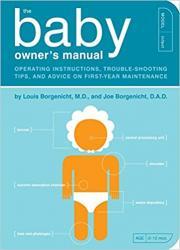
You might be shocked to learn that some men do read the instructions. There have been numerous products that I have purchased over the years which necessitated a read-through of the instructions provided. Usually, these were items of extreme complexity or of thorough interest to me to require fully understanding the items before beginning to use them. The Baby Owner’s Manual might seem like a humorous fusion of a parenting book with a repair manual for a vehicle, but somehow the fusion of these two works better than I would have ever expected.
Published by Quirk Books (who have created other genius mash-ups like Pride and Prejudice and Zombies and Shakespeare’s Star Wars ), The Baby Owner’s Manual takes the complicated and frightening task of keeping a newborn alive and presents the necessary information in a format that any guy can understand. In fact, aside from a few choice substitutions that make a baby seem more like a car than a human, I’d probably keep this book as a useful reference any time something I don’t know how to handle comes up. This will likely be often considering my first child is due near the end of the year.
The only qualm I might have with this book is that some studies have come out since 2003 that have changed a few suggestions the book gives these new parents. Of course, any well-prepared parents will probably be able to pick these inconsistencies out and follow the more current recommendations. In the
end, though, the direct and straightforward method this book uses to convey its information makes it far more useful than just as a gag gift (I’m looking at you, How to Traumatize Your Children).
An instruction manual every man should read, I give The Baby Owner’s Manual 4.5 stars out of 5.
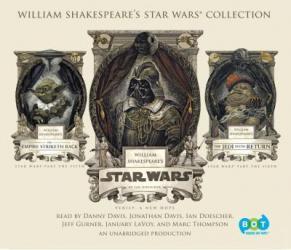
I said it for my review of Shakespeare’s Star Wars , and I’ll say it again: this combination of old verbiage and meter with popular science fiction is a match made in heaven. The follow-up to the first part of the original trilogy, Shakespeare’s The Empire Striketh Back continues to be an amusing exercise that anyone who loves Shakespeare and/or Star Wars will enjoy. Some consider Empire to be the best part of the original trilogy, and its adherence to the plot won’t disappoint. Additionally, the audiobook version continues to use music, sound effects, and voice acting to recreate an experience as close to the source material as possible.
While the audiobook did provide a robust experience of the text (especially the voice actors who recreated Han Solo and C-3PO’s speech patterns), the author’s explanation at the end made me realize there were some aspects that weren’t quite as clear as they would have been if I had just read the book normally. For instance, Yoda’s typically backward speech wasn’t as backward as I would have thought—mostly because the Shakespearean cadence sounds a little backward. Instead, Yoda spoke in haiku, which I’m sure would have been more evident if I was reading the words on the page.
As I mentioned above, Empire is the favorite of many Star Wars fans. However, I’m one of the rare few (like the author) who find Return of the Jedi to be their favorite of these first three films. Consequently, since this book held close to the original plot, it seemed to sag a little between the opening act on Hoth and the third act in Cloud City. At least the added soliloquies from ancillary characters like the AT-AT walkers, random Stormtroopers, and the dangerous creatures of the universe added in some humorous elements to the narrative that weren’t strictly canon.
A fantastic audiobook that still might require a read-through, I give Shakespeare’s The Empire Striketh Back 4.5 stars out of 5.
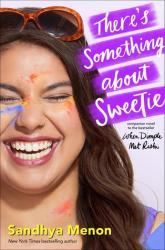
Sweetie Nair is fat. She doesn’t care, but her mom cares. Like, a lot. A lot a lot. Definitely too much. So much that so when Ashish, a hot local boy from a good (and crazy rich!) Indian family tries to date Sweetie, Sweetie’s mom shuts it down. But Sweetie won’t give up without a fight, and so she, Ashish and Ashish’s parents hatch a plan in which the kids will go on four dates. If it works out, they’ll tell Sweetie’s parents. If not, no harm done. Plus, what can happen in four dates? Turns out, a lot.
If you’ve read any of Menon’s other books, this one is completely on brand. I’ve read her other two books, and this one might be my favorite? It’s up there with Dimple, for sure. It’s a funny romantic comedy with endearing, mostly believable characters from a culture that’s different from mine. In addition to reading an adorable book, I get to learn a little bit about Indian Americans. This one has an added element of pointing out our society’s horrible ways of treating fat people. The way a folks react to Sweetie will have you seeing red – but you know it’s unfortunately totally realistic. Luckily, Sweetie is a self-confident young lady, and it was a joy to see her grow throughout the book. Ashish isn’t too bad himself! He has a very believable journey through the course of the book, and was a male lead you could root for even as he made a few terrible decisions.
TLDR: If you’re looking for a light, funny and very swoony read, this one will do it for you. I know it put a smile on my face.
Sandhya Menon is coming to PPLD to be the keynote speaker for Mountain of Authors! Meet her, listen to her give a talk and get a book signed on 27 April at 21c. More information about the event can be found here: https://research.ppld.org/mountainofauthors
Thanks to Netgalley and Simon Pulse for the advance copy, which I received in exchange for an unbiased review. There’s Something About Sweetie will be available for purchase on 14 May – don’t forget to put your copy on hold!
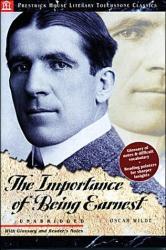
Over the years, I have been assigned to read a multitude of books and plays for English classes - some of those writing pieces I have never committed to and read thoroughly. This year in AP Literature, The Importance of Being Earnest was assigned and was not amongst those writing pieces. In many of the English classes I have enrolled in, there are numerous books or plays - especially Shakespeare - that I have read which might be interesting but the diction is archaic. The words and phrases are not used modernly and therefore, what is written is difficult to understand in the absence of translations or SparkNotes. Despite being published in 1895, The Importance of Being Earnest was an easy read because the play is easily humourous.
The play pursues wealthy and bored protagonists, Jack Worthing and Algernon Moncrieff, as they court two women, Gwendolen Fairfax and Cecily Cardew, pretending to be men named Ernest. Their “Bunburying” depicts the theme that idle hands indulge in mischief. Jack, who resides in the country, introduces a devious and unruly brother named Ernest who resides in the city so that he can be reckless in one place while also being arguably mature in another. Algernon pretends to have to check in on a pale and sickly fellow named Bunbury when he is introduced to responsibilities or events he does not desire to participate in. Eventually, upon hearing of Cecily Cardew, Jack’s ward, from Jack, he pretends to be Ernest as well. The two characters utilize their separate versions of "Bunburying" for their own pleasure rather than for being productive, depicting their own values of dishonesty and deceit.
The characters are self-concerned which is unfortunate because during the 1890s, the time in which this play is set, the Victorian Era endured multiple widespread conflicts including overpopulation, poor sanitary conditions, child labor, and religious insecurity - none of which are mentioned by any of the four characters.
Ultimately, the theme of the play may be applied to the modern era which permits The Importance of Being Earnest to be more relevant when you compare the Victorian upper class to, for example, the Kardashians or other celebrities.
The humorous aspect of the play was Oscar Wilde’s use of epigrams, or clever and paradoxical expressions. Predominantly delivered by Algernon, my favorite of the epigrams was “The amount of women who flirt with their own husbands is scandalous. It is simply washing one’s clean linen in public.”
Additionally, this play is a short read with only about 75 pages.
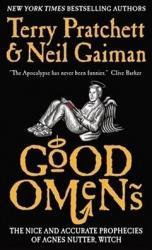
Good Omens is humorous take on Armageddon and the final battle between Heaven and Hell. Complete with an angel and a demon, who get along better with each other than with their immortal counterparts, two witch-finders, Satanic Nuns of the Chattering Order of St. Beryl, aliens, and an eleven year old Antichrist, Good Omens takes a completely different take on the Apocalypse. All predicted by a witch that lived 300 years ago, Good Omens is full of sarcasm, humor, fun, and adventure along with a moral that tells us to look for the good in everyone, even demons. I highly recommend this book for any high schooler or adult looking for a little bit of humor in life.
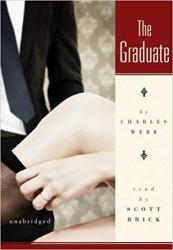
If I could condense this book down to a single phrase, it would be “What?” It’s not that I didn’t understand this book, it’s more that this single word/question was used for every third line of dialogue. Not only was this incredibly annoying to read—as every character seemed to have hearing problems that required the other speaker to repeat themselves—but it just seemed to pad out an already weak plot. I have no idea how this book became so famous that it led to a much superior film adaptation, but now I know that nobody should bother reading this book because of its inspiration for the movie.
Let’s talk about character motivations next. Nothing ever made any sense. Sure, there’s a bit of existential ennui involved with finishing something you excel in (school, in this case), but the actions of the main character only make sense up until a point. Once we hit the third act, there’s just a series of random actions that aren’t grounded in reality. This is also not to mention that the characters around him, especially the primary love interest, also make illogical decisions that aren’t founded in any sort of reality. At least this book is short enough that you’re not going to waste much time reading it.
Maybe I’m just missing the point of this book. Perhaps it’s an examination of the consequences and realizations that come from living a life that seems to have no meaning. I mean, I get the counter-play between the newly-disillusioned Benjamin and the almost permanently-disillusioned Mrs. Robinson; butwhenthe entire thing is filled with awkward and nervous dialogue that constantly repeats itself, I can’t help but think that there isn’t anything significant there. Even the ending was so abrupt and unfulfilling that I had to thank the movie version for its subtleness in revealing the characters’ realization of what they’ve done.
A truly sub-par story that was made into an above average movie, I give The Graduate 2.0 stars out of 5.
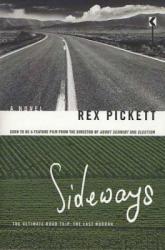
When I got into this book, the only things I knew about it were that it was about wine and it was made into a movie of the same name by Alexander Payne. Unfortunately, unlike a good wine, this book doesn’t seem to have aged well. Maybe people were able to put up with buddy comedy sex romps back in the early2000’s, but the social climate has changed considerably since then. I doubt a book like this would be written today, at least without some outcry from people who find the women in it to be inherently objectified.
Most of my issue with this book comes down to the characters. I’ll give the author credit for creating individuals that made me react to them so vehemently. The problem is that I hated these characters. I hated Jack for being so sex-crazed that he felt obligated to satiate his urges mere days before his wedding. Ihated Miles for being the stereotypical alcoholic failing author. If you wanted a template for poor life decisions, I think these two characters would fit the bill. There wasn’t much (if any) redemption in either of their story arcs, and both of them just seemed to enable their worse selves.
In the end, this book is supposed to be a comedy. At least, it’s a comedy in the sense that it ended with a wedding (as most comedic plays and musicals usually do). Sure, it’s filled with witty banter and some good stretches of natural dialogue, but there was hardly any vulnerability of the characters to give them any grounding. One moment near the end briefly pulled away to let Miles reminisce, but I would have liked some more consequences that would have forced both men to change for the better. And maybe that’s the point: real life doesn’t work that way, and I hate that there are real men out there who have these very same faults.
Terrible people in somewhat amusing situations, I give Sideways 2.5 stars out
of 5.
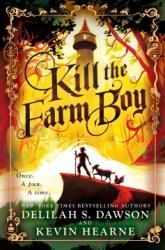
It took me a while to review this book because I couldn’t figure out exactly how to rate it. This novel is a pun filled fantasy adventure that pokes fun at the traditional fantasy quest. It involves magic, elves, a dark lord name Toby, sleeping maidens, a sand witch named Grinda, a talking goat named Gustave, fairies, a bunny bard named Argabella, a female warrior named Fia, a rogue name Poltro, and a harrowing danger filled quest to cure the dead-ness of a farm boy name Worstley, killed at the beginning of this book, that was destined to fulfill a great destiny …. or so we thought.
While at times this book was funny, I particularly enjoyed the details of how the world was described, for example when the enchanted castle and the maids were being described at the beginning of the book, particularly the last line. “There was also an abundance of portent swaddled about the place. Oodles of it. A surfeit, even. Something would go down there soon. But for now, the lady slept. And drooled a little, probably.” Or the dark lord’s constant obsession with cheese and crackers throughout the book.
Other times, I think the humor went over the top, which was not a particularly big selling point for me and leaves a somewhat sour taste in my mouth. For example, when our heroes arrive at the hut of the healer and Agrabella first wakes up after being healed. “In this case with her eyes shut, Argabella had to assume she was being licked across the face by a troll with gingivitis who’d recently partaken of fresh garlic and sardines and possibly eaten another, even sicker troll for breakfast. Her eyes burst open… She soon realized that this was because she was staring into someone’s extremely furry armpit” Or maybe it was the fact that books with tropes and puns are just not the type of books I am particularly drawn too or like. However, I do appreciate and like each of the character’s own inner dialogue as they wrestle with their feelings and other issues throughout their journey together. For example, when the warrior realizes she love’s the bunny bard, “She realized that even more than roses, even more than a proper set of armor, she wanted to be kind and generous and the whole range of happy adjectives to this truly unique woman for a long, long time.”
Overall I think this books was well written, and at times funny, it takes a traditional subject, fantasy quests, and turns it into something new entirely. While this book wasn’t for me particularly, I would recommend it for anyone who loves, Monty Python and the Holy Grail, The Princess Bride.
the movie Space Balls, or anything with wacky humor. This book comes out today so put a copy on your holds list! Thank you to Negalley and the publisher Del Rey for a free e-arc of this book in exchange for an honest review.
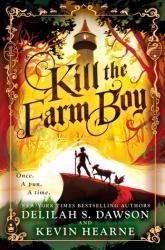
Normally, I’d start off my review with a synopsis, but plot wasn’t exactly the point of this book, so I’m going to skip it. What you need to know is this: Kill the Farm boy is a satirical fantasy novel that skewers the “chosen one” white male narrative. Tonally, it’s as if Deadpool were your dungeon master and he had recently swallowed a thesaurus. If that appeals to you, you will love this book. If not, pass on it.
I had fairly mixed feelings – humor is subjective, and while I sometimes found it funny, I also found it grating at times. For example, there was a chapter about trolls that had me in stitches. But there was also an entire chapter about the group entering the Morningwood that had me rolling my eyes. A certain type of audience will absolutely love this one. I was not that audience, but I still, for the most part, appreciated it for what it was as I generally found the writing quality to be very high. There’s little character development, and the plot is just a vehicle for jokes, but again, those things aren’t the point.
This is definitely one of those books that will be very hit-or-miss for people, and while it was mostly a miss for me, it’s one that I think I’ll be recommending to a lot of patrons, particularly teens. If you like Mel Brooks or Monty Python, you’ll probably like this too (it would make a pretty funny movie).
Thanks to Del Rey and Netgalley for the eARC, which I received in exchange for an unbiased review. Kill the Farm Boy will be released on 24 July, but you can put your copy on hold today!
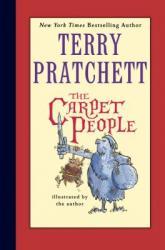
Having now read one of Terry Pratchett's books, I thought it might be interesting to go back and read his very first work. Many authors don't manage to become famous with their very first book, and I think Terry Pratchett is no exception here. The Carpet People is an amusing book with his standard British charm, but I think it never goes far enough in its exploration of the idea. After all, I was expecting this book to be more along the lines of The Borrowers instead of just a straight-up fantasy with a few references to the fact that these creatures lived in the carpet.
Part of the problem I seemed to have with this book was the incessant need for fantasy books to create new names for objects and creatures that already (mostly) exist. If you took away the carpet setting, I think this book could be practically indistinguishable from any other fantasy book. This is what disappointed me the most. I believe there are plenty of potential moments to highlight the size disparity between creatures that live in the carpet, and the rest of the world we're familiar with (a la Honey, I Shrunk the Kids (1989)).
Granted, I will give this book some grace considering that Terry Pratchett originally wrote it when he was a teenager. For this reason alone, I do have to say that it should be an inspiration for young writers, just to show that it can be done. Pratchett clearly improved his writing skills over time to become a bestselling author, but it's important to recognize and realize that he didn't start out that way. Ironically enough, though, I almost preferred the serialized version of this story that he originally wrote over the more "standard" version that aligns with his later styles.
An amusing book and impressive first novel for a teenage Terry Pratchett, I give The Carpet People 3.0 stars out of 5.
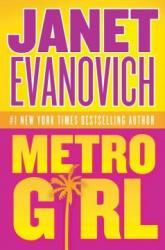
I can honestly say, this is the worst book I have read in 2018. I couldn't believe it was written by Janet Evanovich. It lacked her usual wit and laugh out loud moments. I actually thought I would love it since I enjoyed the graphic novel. But no. I didn't care about any of the characters.
I thought the story line plodded along and at the end, I just didn't care. I was hoping a canister of nerve gas would just destroy every copy of this book so no one else who's thinking of reading will suffer.
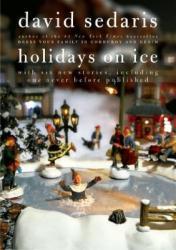
I listened to this book, most of which was read in a nasally, whiny voice. The initial stories about working as an elf at Christmas-time had tears of laughter pouring out of my eyes, Unfortunately, the book rapidly went downhill. This satire started out funny, but it kept going too long as if the author didn't know when to end the story. There were also some disturbing images that added absolutely nothing. The stories were sarcastic, but the bitterness in them really turned me off. Can't recommend it.
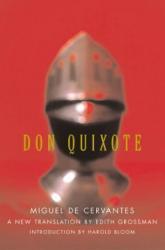
Written in 1605, and translated in at least 50 languages, the novel Don Quixote has often been considered the father of western literature. And for good reason. Coming in at around over 900 pages, this novel is an amazing read. This book follows the hilarious journey of Don Quixote and his portly sidekick, Sancho Panza, as they travel around Spain searching for adventures. I would suggest this book to anyone who enjoys long novels, humor, or anything like Princess Bride.
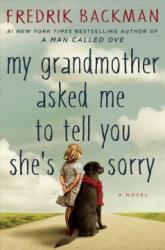
Fredrick Backman’s wit and humor ties in wonderfully with a tear-jerking finale. From beginning to end, I was torn between laughing and weeping. The innocence and wonder of childhood is perfectly captured, while also including the remorse of being thrust into the real world. Elsa, a seven year old girl, has an eccentric grandmother, the kind who just wants to make her happy. Her grandmother, however, does this in an odd way; shooting-paintballs-at- pedestrians-off-her-balcony type of way. And it works. Although Elsa is chased and bullied at school, her grandmother can paint a wonderful picture in her mind. But too soon, she dies of cancer, leaving behind a trail of letters for Elsa to discover, taking her on her last ever quest from her
grandma: giving the letters to their recipients. On the way, she discovers the story behind faces she never gave a second thought. Backman paints a masterpiece with his words, keeping me hooked and enthralled at every turn of this book.
Reviewer Grade: 7
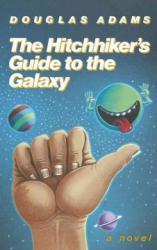
The Hitchhiker’s Guide to the Galaxy by Douglas Adams is witty, genius, and an example of common English humor: dry, but hilarious.
Seconds before Earth is blown away to make way for an intergalactic freeway, Arthur Dent discovers galaxies and planets, lightyears beyond his own. He hitches a ride with his best friend, Ford Perfect. Ford is a cleverly disguised alien, who has been stranded on Earth for the past 15 years as he writes a revised guide to the galaxy. Arthur and Ford happen to hitch ride with the most disagreeable and intolerable creatures, the Vogon. They are then discovered and thrown into the soul-sucking abyss of space. Seconds before they suffocate, Ford and Arthur are picked up by a recently stolen ship, stolen by the president of the galaxy, Zaphod Beeblebrox, and his girlfriend, Trillian. The ship is on an improbability drive, which is why they crash land on a long believed mythical planet, called the Heart of Gold.
The planet was in a hibernation-like state, and has only just awoken recently. Trillian, Ford, and Zaphod explore while Arthur meets Slartibartfast, who explains that the Earth was a test, run by mice, to discovery the Question of Life, since they know the answer is 42. However, Earth was destroyed seconds before test completion. Trillian, Zaphod, and Ford are captured by the mice and kept in a dream-like prison. That is, until Arthur is brought to the mice and the group is reunited. The mice explain that they are interested in harvesting Arthur’s brain as organic evidence.
So, naturally, the group manages to escape in the knick of time, avoiding both the mice and the galaxy police, who are searching for Zaphod.
Reviewer Grade: 7
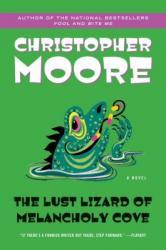
This book is riddled with real humor. It is a dark thriller and will leave you wondering how the author managed to not split his sides while writing it. It is an easy read and the break up of character plus chapters makes me think I am watching it in film. This would be an interesting story in film but definitely hilarious nevertheless.
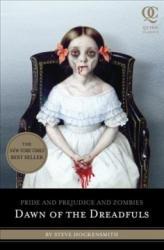
As I’ve mentioned before in my review of Pride and Prejudice and Zombies , I understand the concept of combining this classic piece of romantic literature with its complete obverse; it just felt like it was almost held back from its full potential by adhering to (most of) the original manuscript. With the prequel to this book, Dawn of the Dreadfuls manages to examine the ridiculous nature of this mashup in a way that’s so tongue-in-cheek that the tongue has practically ruptured the cheek entirely.
That is, this prequel doesn’t take itself nearly as seriously as the original Jane Austen adaptation did.
Even if the non-Pride and Prejudice and Zombies characters were mostly cartoonish in their representation of stereotypes and tropes, they were fun to read as they provided a delightful offset to the canonical characters of the Bennet family. Also, instead of trying to find some boring section of text wherein to insert some zombie excitement, Dawn of the Dreadfuls provides equal parts action and society to accommodate a balance that highlighted the extreme disparity between the two. In fact, when the two finally meet, it’s during the exciting climax of the story. Of course, knowing this is a prequel means there has to be some way out of the predicament; otherwise the original Pride and Prejudice and Zombies book cannot take place.
Despite all the things it has going for it, Dawn of the Dreadfuls suffers from a plot that seems to drag along like the un-functioning foot of a zombie. Sure, each plot point has its purpose, but they almost seem to belabor the point. There were a few chapters where I felt the plot to be somewhat repetitive if it weren’t for a slightly different outcome to show character growth. In any case, I’d still prefer this book over Pride and Prejudice and Zombies.
A prequel that could fully explore a ridiculous combination, I give Dawn of the Dreadfuls 3.5 stars out of 5.
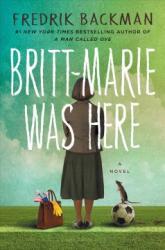
Britt-Marie was Here is the incredible sequel to My Grandmother Asked Me to Tell You She’s Sorry, both of which are fantastic books. Britt-Marie is a picky, stubborn, and socially awkward old woman. She doesn’t criticize or judge people, even if they’re as rude, messy, and vulgar as they are. But hidden inside the busybody is somebody who dreams and imagines, just like the rest of us. When she moves to a new town, she is confronted with people who have muddy floors (an unforgivable sin), disorganized drawers (oh, the horror!), and ‘modern’ hairstyles (Shriek!). This book perfectly captures the everyday messiness and beauty of human life, complete with humor along the way. It will make you look at the curmudgeons in your life a different way!
Reviewer's Grade: 7
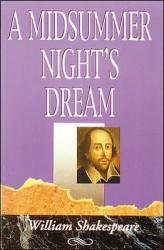
A Midsummer's Night Dream is one of Shakespeare's many plays that he wrote. Unlike many of his works, this one does not have a sad and tragic ending, and is a drama more than anything. The story is about four lovers Hermia, Helena, Lysander, and Demetrius. There is a whole love triangle where Hermia loves Lysander, but is forced to marry Demetrius, who Helena loves. For Hermia to escape getting married to someone she doesn't love, she and Lysander run off into a forest where they are outside the law. Already in the forest, there is drama going on between two faeries, Oberon and Titania. Titania is protecting an Indian boy that Oberon wants, so Oberon gets his faerie Puck to go receive a love potion, so that Titania will now be distracted by love and Oberon can snatch the Indian child. Back in the city however, there is a group of actors organizing a play. After one of them tries to take up every part in the play, they get it all organized and head off to the forest to practice. So already in the first act we got everybody running off to the forest to cause drama. This play shines at how good its humor is, and is jammed pack with drama. I would recommend anyone to read this fancy story.
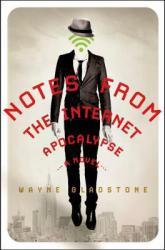
The main concept behind Notes from the Internet Apocalypse is interesting: one day, the internet just stops working. All the computers and phone lines still work, but the internet has just gone missing. The story that results should be considered a satire since I hardly believe people who have hidden behind a veil of anonymity for so long will do the same deplorable things in real life just to get their “internet fix.” Bringing the reality of our connected society to its extreme logical conclusion in a world without internet, Notes from the Internet Apocalypse is a harsh mirror of what we’ve become, even to the point of cringing at it.
I was a little taken aback by the amount of vulgar language, overt sexuality, and lack of common decency by the characters in this book. Of course, in a book about the internet, these types of people run rampant. If I were one to include animated gif memes in my reviews, I’d likely insert the Arrested Development “I Don’t Know What I Expected” one at this juncture. Yes, the internet is mostly pornography, and the rest seems to be filled with trolls who comment on news articles and YouTube videos, but I doubt these people would resort to acting out their internet lives in real life.
In the end, I had kind of hoped the subtle undertone of addiction was the focus of this book. With the main character who’s clearly alcoholic (even to the amusing point of calling Jameson’s Irish Whiskey “scotch”), and supporting characters who are either addicted to recreational drugs or sex, I wanted the satire of the book to focus on our addictive personalities as a culture, merely perpetuated and sustained via the ever-present internet. As it is, the ending wasn’t quite satisfying enough, providing a preachy bumper sticker to get readers to tune in to the next volume in this series.
An interesting concept that highlights the lowest common denominator, I give Notes from the Internet Apocalypse 2.5 stars out of 5.
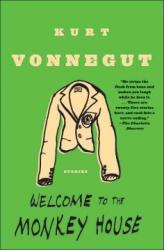
Much like short story anthologies by a single author (see Neil Gaiman’s Smoke and Mirrors and Ray Bradbury’s The Golden Apples of the Sun ), Welcome to the Monkey House is both quintessentially a collection of Kurt Vonnegut’s biting wit and satire as well as an exploration of other genres not often associated with Vonnegut’s style. Fans of Vonnegut will likely have already read some of these short stories (like “EPICAC” and “Tomorrow and Tomorrow and Tomorrow”), but some of the other stories might have been missed and for a good reason.
Overall, Welcome to the Monkey House is a fantastic set of stories, but a few of them fail to have the impact to make them memorable. Granted, these stories are few and far between, and help to break up the well-written social commentaries presented in “Harrison Bergeron” and the titular “Welcome to the Monkey House.” Vonnegut’s ability to show the slippery slope of such ideas as “everyone is equal” and “sex is bad,” respectively, is just as poignant in short form as it is in his novels. The fusion of technology in these stories might seem dated by today’s standards, but they do reveal that Vonnegut was, inherently, a science-fiction writer.
What this collection does well is show that Vonnegut understood the importance of the characters in a story. One of the most entertaining in this collection was “Who Am I This Time?” which contained characters at such extremes of human expression as to be completely unrealistic but somehow relatable and entertaining. Stories like this, which don’t necessarily follow the political or societal commentary that the other stories provide, are nice breathers that give the reader a smile instead of drilling thought-provoking ideas into their skulls. It’s this balance that truly makes Welcome to the Monkey House a must-read.
Vonnegut, true to form as well as outside his element, I give Welcome to the Monkey House 4.0 stars out of 5.
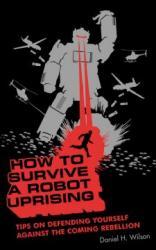
As a precursor to Robopocalypse , How to Survive a Robot Uprising: Tips on Defending Yourself Against the Coming Rebellion takes a humorous approach to educating the reader about the capabilities and limitations of today’s robots. Similar in style to Where's My Jetpack?: A Guide to the Amazing Science Fiction Future That Never Arrived , How to Survive a Robot Uprising uses the humor of preparing for the end of the world to poke fun at the limited possibility that we’d eventually be destroyed by the robots we use to make our lives comfortable today.
With my background in robotics (my Master’s Degree was in Mechanical Engineering with a focus on Robotics and Design), I quickly realized how Daniel H. Wilson was writing this “guide.” Robots are powerful and useful machines, many of which can perform actions much more efficiently and accurately than humans can, thus leading to our swift and inexorable demise.
However, by the same token, they also have limitations and challenges that we humans do not (or at least don’t consciously think about). These robotic challenges are primarily used “against” them in this hypothetical scenario, revealing that most robots aren’t as indestructible as we make them out to be in fiction.
My only qualms with this book were that it was too short (I love this tongue-in-cheek writing style) and that the structure seemed kind of “loose.” Sure, different sections went over such topics as types of robots, and what ways these robots could be incapacitated, but the flow felt a bit like “stream of consciousness” writing. Granted, many of the topics cross over into each other, so it can be difficult to box them into discrete and distinct sections. Still, the narrative seems to jump all over the place as a result. Perhaps this is why Wilson decided to eventually write Robopocalypse, to add the structure that was missing from this “pamphlet.”
A funny book that subtly educates the reader about robot strengths and weaknesses, I give How to Survive a Robot Uprising 4.0 stars out of 5.
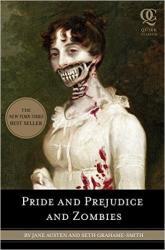
Back in the zombie heyday of 2009, the idea of combining one of the most feminine pieces of literature with the oft masculine-marketed gory violence seemed like an interesting idea. I, for one, didn’t particularly care to read Jane Austen’s Pride and Prejudice , but this take on the romantic classic certainly piqued my interest. Because of the addition of zombies to this plot, I was impelled to read this story to see how these drastically different archetypes were combined. I certainly wonder if the book would have been more enjoyable if I had read Pride and Prejudice beforehand, or if I would have remained far abreast of it altogether.
Partly due to the severe dichotomy of the original story and the zombie additions, there were certainly moments where I could tell what segments of Jane Austen’s plot were modified to fit the new, apocalyptic sensibilities.
The two concepts worked together somewhat, occasionally adding action to a scene that would have likely been boring in its predecessor, but in maintaining the story and outcomes of the original, the whole experiment didn’t quite “gel” as it could have. Perhaps the addition of the prequel and sequel to this book helps to round out these distinct edges, but I have yet to read those books yet.
When it comes right down to it, I struggled to get through this book. With the language and verbiage retaining is feel from the original, the archaic nature of the dialogue was not as easy to read as I would have hoped. In the end, I was practically just reading Pride and Prejudice, but occasionally “changing the channel” to a zombie film whenever anything became boring.
I applaud Seth Grahame-Smith for following through on this ambitious idea, but it almost seems like anyone could easily merge zombies to a romantic classic if they maintain the majority of the source material.
An intriguing idea that never quite fully “connects,” I give Pride and Prejudice and Zombies 3.0 stars out of 5.
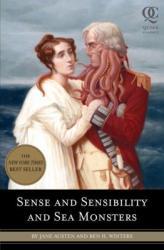
After struggling my way through Pride and Prejudice and Zombies, I thought perhaps the next entry in the “Quirk Classics” line of books would be better. After all, it had a new co-author (alongside Jane Austen) and replaced the almost cliché zombie trope with the lesser-seen sea monster framing. Unfortunately, I once again found myself struggling through the archaic language of Austen’s time. Not only that, but I felt there was far too much talking and way too much nonsense, and that wasn’t even about the sea monsters. I’m starting to suspect that I just plain don’t like Jane Austen’s writing.
Half of the book is practically filled with young women swooning over eligible bachelors, learning that these bachelors are engaged or married, and then becoming depressed because of this revelation. If they spent less time gossiping and more time communicating, perhaps they wouldn’t have these problems. Of course, I realize that this was probably an artifact of the era in which the original Sense and Sensibility was written, but it all seems pretty “senseless” if you ask me. Speaking of senseless, this book certainly delivers on a lot of it, when it comes to the violence of the sea monsters.
As was the case with Pride and Prejudice and Zombies, I feel Austen’s prose holds back the potential for a much more interesting story. Practically steampunk in its underwater cities and rudimentary diving systems, if this book was an original story, I think it would have been much more interesting to read instead of having to slog through another Jane Austen novel. Of course, most people probably wouldn’t have picked up such a novel, because they wouldn’t know what it’s about. Modifying a Jane Austen story merely gets readers in the door, but it seems like a lazy solution to gain sales instead of a way to create an engaging narrative.
Another attempt at fusing Jane Austen with unnecessary violence, I give Sense and Sensibility and Sea Monsters 3.0 stars out of 5.
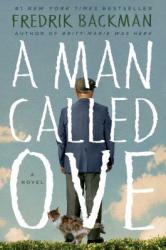
I absolutely loved this book. On the cover it said you would laugh and cry as you got to know a Man Called Ove. And it was true! Ove is a man with blinding grief after losing his wife and then being forced to retire from his job. He has no purpose and doesn't want to live. But one by one, people (and a cat) come into his life and gives his purpose. Friedrik Backman was able to tackle so many social issues in this book. I was very impressed how he handle things and didn't really have to "hit" you over the head with the issues. This book is a fast read and great for book discussion groups. I can't wait to read more by Fredrik Backman!
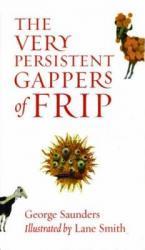
“The Very Persistent Gappers of Frip” is a mere 82 pages, and features the witty lyricism of George Saunders, National Book Award finalist, and the whimsical illustrations of Lane Smith. One might call the story an adult fairy-tale, but I believe both young and old will find it humorous and intriguing.
The story introduces the reader to round, baseball-sized creatures called gappers. They are bright orange, not particularly intelligent, and simply love goats. Saunders explains that, “when a gapper gets near a goat it gives off a continual high-pitched happy shriek of pleasure that makes it impossible for the goat to sleep” (2). For the three families that make up the town of Frip, this is bad news. Goats are their livelihood and so the children of these families must brush gappers off their goats eight times a day to keep their goats happily producing milk. The gapper trouble increases for Capable and her father when a slightly more intelligent gapper takes charge of the goat-loving critters. He decides that the whole lot should gang up on a single house rather than splitting themselves between the three houses of Frip. The other two families rejoice in their gapper-less good fortune, but poor Capable and her goats are quickly overrun by the united forces of gappers.
This story is funny, very creative, and poignant in its understanding of human nature. It expresses the importance of community and kindness, and in a way that sounds only a little preachy. Overall, “The Very Persistent Gappers of Frip,” is definitely worth a read. It requires a single sitting to finish, and rewards the reader with plenty of laughs and a renewed sense of what it means to be a neighbor.
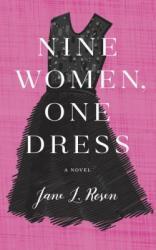
I have to admit, I chose to read this book based on the title alone! I liked the title and I loved the book. Classic chick-lit. The main character of the book is the LBD (Little Black Dress) of the season. The dress that every woman, no matter her age or size, wants! The dress affects the lives of not only the nine women, but a few men too! If you are looking for an easy read, this book is for you! It made me laugh and smile. A fun read! I can't wait for Jane L. Rosen's next book.
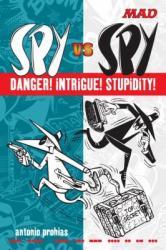
This is a republished work from The All New Mad Secret File On Spy vs Spy. Prohias' compendium of the popular comic strip Spy vs Spy, which appears in MAD Magazine, does not disappoint the Spy vs Spy fandom. Done with great detail and care, each story takes an unexpected turn and you never REALLY know which of the two spies, black or white, will actually be the victor of that particular strip. They all end creatively, typically humorously, and you'll never know how the story will develop.
Prohias is originally a refugee from Cuba and after receiving death threats from Fidel Castro moved to the USA. While it's easy to be caught up in the simplicity of this wordless story, it also is an allegory for the struggle and fruitlessness of the Cold War in the opinion of the author. I love both its simplicity and complexity contained within just a few drawings. Both those who are looking for an easy laugh and those looking for more than that should be satisfied by this collection.
The panels have been blown up so you can really soak in all the detail and hard work Prohias has put into each strip. This can either be interpreted as a good or bad thing. Individuals who are familiar with the strip might enjoy it more since you can really see all the details and take your time examining each panel, taking in all the details that MAD Magazine is famous for. That said, since each page takes up a whole panel what originally took up an eighth of a page can now last five or six full pages of the book. I could see how this could be frustrating for those who are used to graphic novels/comics that are jammed packed. Again, the beauty is in the seeming simplicity of this strip with the underlying complexity, whether it be the story or the art itself. I'd recommend fully for those who are familiar with the strip, while, if you are a Spy vs Spy novice, I might suggest something a bit denser to get a better feel for the comic. Four Stars.
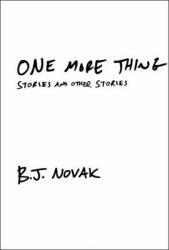
Ever wonder what your grandmother might be up to in heaven? Or maybe why it is that there are some people who just give the best advice? BJ Novak, writer and star of The Office, explores these topics and much more in his refreshingly hilarious One More Thing: Stories and Other Stories. Tales run the gamut of the absurd to the seemingly mundane: from a peek inside a blind date with a warlord, to a boy who is not allowed to eat sugary name-brand cereals. Each story is almost like two sides of the same coin, all at once being achingly funny and heartbreakingly human. The collection, while as a whole is mostly always humorous, ebbs and flows with a sincerity that demonstrates Novak’s keen ability to not only write about human emotion, but to make the reader feel it as well. One More Thing shows that Novak’s writing is intelligent, his command of language sharp and his wry humor at its best.
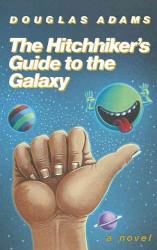
When Ford Prefect, an undercover alien that got stuck on Earth, realized that Earth would soon be blown into smithereens, he and his human friend, Arthur Dent, escape and embark on an adventure through space. The Hitchhiker's Guide to the Galaxy parodies other sci-fi novels, which is enjoyable for those who are experienced with that particular genre. This novel is very light-hearted, simple, and it doesn't really get too serious anywhere. The humor is random and ridiculous (in a good way), and it really was what made the book. All of the characters had strong and eccentric personalities with their own little quirks that make them special; they were all very engaging. It's a pretty good classic (that's why I chose to read it in the first place), it's very quotable (and who doesn't like quotes?), and fast-paced. It might seem a little immature to a select few, but the amount of people who like it heavily outweigh the ones who don't.
Reviewer Grade: 8